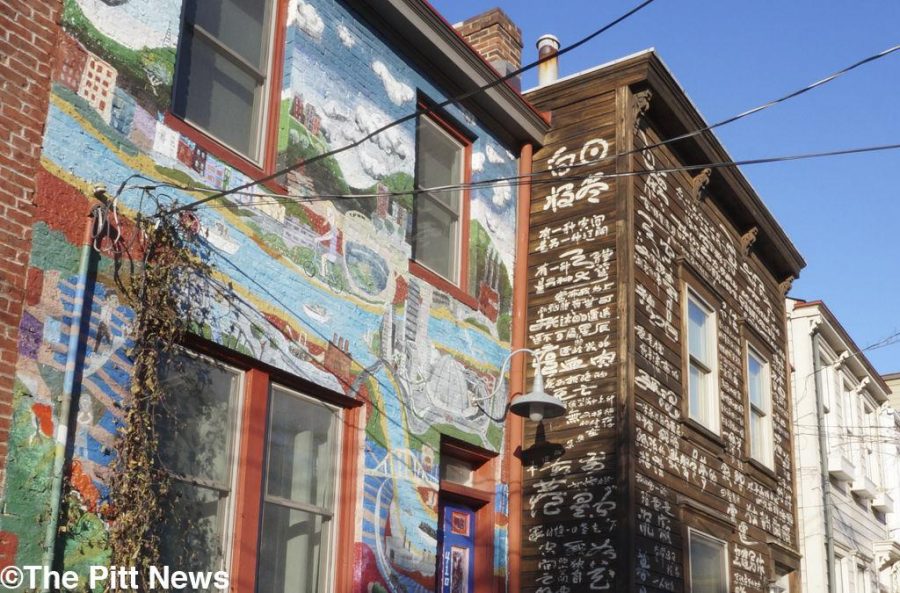City of Asylum writers take refuge in Pittsburgh
January 5, 2015
Four years ago, a weak Israel Centeno, recovering from Dengue fever, presented his novel “Bajo las hojas,” or “Under the Leaves,” in his native country of Venezuela. One week later, he left his wife, children and home after boarding a flight to Houston, looking out the plane window only to see his country shrouded in darkness on a moonless night.
“I only can see a shadow,” said Centeno, an exiled writer in residence at City of Asylum/Pittsburgh, while recounting the flight to the United States. “[A]n enormous shadow sketched in the darkness as my country, maybe the future.”
Centeno has resided since 2011 at City of Asylum/Pittsburgh in the Northside. He was forced to leave Caracas, Venezuela, after he wrote “El Complot,” or “The Conspiracy,” which is a fictional work about the attempted assassination of then-President Hugo Chavez. Chavez and his militia groups threatened Centeno after the novel’s publication.
The Pittsburgh location is a local branch of an organization inspired by Salman Rushdie, author of “The Satanic Verses.” Rushdie sought refuge after his novel’s publication resulted in the Supreme Leader of Iran called for his death with a fatwa, or a jurist-issued legal interpretation on issues related to Islamic law, in 1989.
Since then, the Cities of Asylum network has grown to include a large number of government-run branches in Europe, plus two other U.S. branches in Las Vegas, Nev. and Ithaca, N.Y.
City of Asylum’s foremost mission is to “provide sanctuary for exiled writers,” according to marketing manager Nick Courage. The Pittsburgh branch opened 10 years ago.
Since then, the organization, located on Sampsonia Way, has hosted five writers who were threatened or endangered because of works they published in their native countries. Centeno is one of two current long-term writers in residence — the other is Iranian Yaghoub Yadali, the newest exiled writer in residence.
Centeno was an opinions writer at two newspapers and vice president of the Venezuelan Pen Club, through which he regularly criticized former President Hugo Chavez. He wasn’t personally threatened for his writing, however, until “El Complot.”
Centeno heard about City of Asylum from a friend while in Barcelona, Spain. The friend, who is also a writer and publisher, connected him with the Pittsburgh branch.
“The process at the beginning was hard,” Centeno said of leaving his home country. “My first concern was bringing my two daughters and my wife to Pittsburgh.”
After a few years, he was granted permanent resident status as an “alien of extraordinary ability,” he said, and could finally reunite with his family.
The transition is still difficult for Centeno. He and his wife have struggled to learn English and are currently searching for work in Pittsburgh or along the East Coast.
“I left my country because I would like [to] continue my career as a writer and I am still trying to figure out how,” Centeno said.
Aside from providing a safe haven for international writers, City of Asylum/Pittsburgh offers other programming, such as creative placemaking, like the series of “House Publications” that line Sampsonia Way. “House Publications” are a collection of four townhouses the facades of which have been used as canvases for not only writing, but also painting, wood-carving and mosaic.
The first in the series is “House Poems,” created by long-term exiled writer Huang Xiang from China.
Xiang was imprisoned and tortured for his poetry. When he arrived in Pittsburgh, he “wanted to write his poems everywhere,” Courage said. “Everywhere” included the exterior of the house that Huang was living in, and continued to live in for almost three years.
The other three houses in the series are the “Jazz House,” “Pittsburgh-Burma House” and “Winged House.”
Monique Briones said she and her friend once stumbled upon the block while they were looking for the Mattress Factory, a contemporary art museum also located in North Side.
“We saw the exterior of the Winged House,” said Briones, a senior English writing and economics major. “The rest of the block was also wonderful to look at because each house has its own unique mural, and they reflect the history and culture of the country that the artist who lives there has been exiled from.”
City of Asylum/Pittsburgh also regularly hosts salon readings by local and visiting authors. In the past, the organization has held events like a Cuban hip-hop show with translated lyric pamphlets for audience members to follow along, as well as a collaboration with the Andy Warhol Museum to make print-screened T-shirts and tote bags.
Although she’s seen advertising from Pitt’s theatre arts department for City of Asylum events, Briones said, she hasn’t yet gotten the opportunity to attend one.
“It’s definitely piqued my interest knowing that Pittsburgh houses these sort of artists,” Briones said.
The programming efforts will increase in 2015, Courage said, and he encourages students to come to the events.
“Our events are legitimately really fun and interesting, and there’s food and drink, so it’s a free night out,” Courage said. “It’s not like ‘eat your Wheaties.’ Come to a cultural event.”



